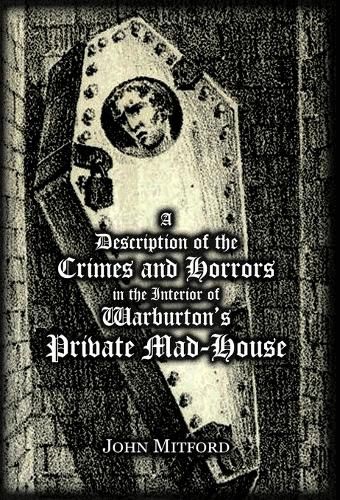Readings Newsletter
Become a Readings Member to make your shopping experience even easier.
Sign in or sign up for free!
You’re not far away from qualifying for FREE standard shipping within Australia
You’ve qualified for FREE standard shipping within Australia
The cart is loading…






This title is printed to order. This book may have been self-published. If so, we cannot guarantee the quality of the content. In the main most books will have gone through the editing process however some may not. We therefore suggest that you be aware of this before ordering this book. If in doubt check either the author or publisher’s details as we are unable to accept any returns unless they are faulty. Please contact us if you have any questions.
When Lady Briget Perceval tricked John Mitford into supporting her campaign to promote Caroline of Brunswick, the then Princess of Wales, he was hidden away in Whitmore House, a for-profit mad-house owned by the cany and bombastic Thomas Warburton. From the inside, Mitford helped Lady Perceval place forged letters in the newspapers-an arrangement that ended badly, with a falling out and a lawsuit from which Mitford was acquitted. During his stay, he had opportunity to observe the cruel suffering to which mental patients were subjected in this and other private asylums, many of which were equally if not even more depraved and corrupt. The horrors were such that he, a Navy Officer who had seen his fair share of inhumanity and death, was moved to campaign for their abolition. In the two pamphlets collected herein, first published in the 1820s, he describes the filth and revolting conditions, the brutal punishments, the debauchery of the keeperesses, the fleecing of patients, the pretences put up for visiting relatives, the (perfectly sane) wealthy criminals absconding to evade justice, the weaponisation of certificates on insanity obtainable from quack doctors and corrupt physicians, and the preferential treatment given to those with money and aristocratic connections. The revelations helped trigger the 1827 Select Committee to investigate conditions at the Bethnal Green asylums, whose notoriety proved instrumental in the the introduction of the Act for the Regulation of Madhouses of 1828, which prescribed new rules for the committing of patients to asylums and licensed houses.
$9.00 standard shipping within Australia
FREE standard shipping within Australia for orders over $100.00
Express & International shipping calculated at checkout
This title is printed to order. This book may have been self-published. If so, we cannot guarantee the quality of the content. In the main most books will have gone through the editing process however some may not. We therefore suggest that you be aware of this before ordering this book. If in doubt check either the author or publisher’s details as we are unable to accept any returns unless they are faulty. Please contact us if you have any questions.
When Lady Briget Perceval tricked John Mitford into supporting her campaign to promote Caroline of Brunswick, the then Princess of Wales, he was hidden away in Whitmore House, a for-profit mad-house owned by the cany and bombastic Thomas Warburton. From the inside, Mitford helped Lady Perceval place forged letters in the newspapers-an arrangement that ended badly, with a falling out and a lawsuit from which Mitford was acquitted. During his stay, he had opportunity to observe the cruel suffering to which mental patients were subjected in this and other private asylums, many of which were equally if not even more depraved and corrupt. The horrors were such that he, a Navy Officer who had seen his fair share of inhumanity and death, was moved to campaign for their abolition. In the two pamphlets collected herein, first published in the 1820s, he describes the filth and revolting conditions, the brutal punishments, the debauchery of the keeperesses, the fleecing of patients, the pretences put up for visiting relatives, the (perfectly sane) wealthy criminals absconding to evade justice, the weaponisation of certificates on insanity obtainable from quack doctors and corrupt physicians, and the preferential treatment given to those with money and aristocratic connections. The revelations helped trigger the 1827 Select Committee to investigate conditions at the Bethnal Green asylums, whose notoriety proved instrumental in the the introduction of the Act for the Regulation of Madhouses of 1828, which prescribed new rules for the committing of patients to asylums and licensed houses.